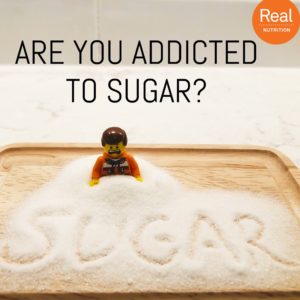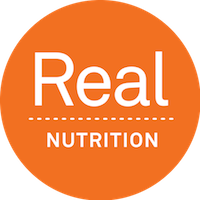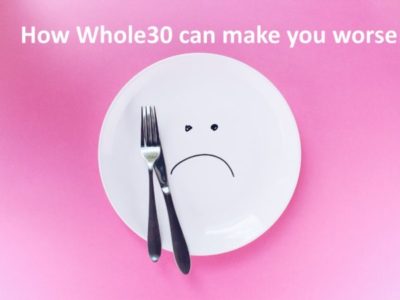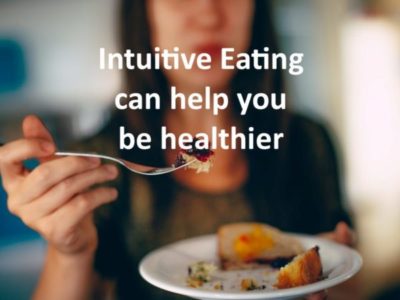
There’s been a lot of hype about sugar addiction lately. How do you know if you’re addicted? Take this easy quiz to find out!
- Have you ever been abducted by aliens that may have brainwashed you? Yes or No
- Do you have something other than a brain in your head, such as a parasitic, sugar-eating slug? Yes or No
- Do you believe in unicorns? Yes or No
If you answered “Yes” to any of these questions, you might be prone to sugar addiction. There’s no way to know for sure.
Ok, I am teasing you.
You figured that out with the first question, right?
Everywhere I turn, I hear people talking about sugar addiction. New clients come into my office, telling me they need help “quitting sugar.” (My first thought is always, “Why? Sugar is delicious!”) Social media is ballooning with posts about how to quit sugar, how sugar is toxic, and how it’s basically the root of all evil. People on diets posting about how they long for a cookie. Here’s the thing: sugar addiction, as far as science can tell us, is not a thing.
What’s the truth about sugar addiction?
People that feel they are addicted to sugar may feel trapped, frustrated, or fearful of the power food can hold over them. But they aren’t addicted in a true sense of the word. But it can feel like addiction, and it can feel scary.
Please understand, I don’t want to make light of those going through eating disorders, disordered eating, or any kind of eating pattern that feels like an addiction or out of control for that individual. These behaviors are real and need compassion and professional treatment.
Addiction comes in many forms: drugs, alcohol, gambling, pornography, and more. Addictive behaviors disrupt a person’s life. They can tear apart families, lead to job loss, lead to decline of health, and a whole host of other negative consequences. Those suffering from these addictions need comprehensive support and treatment.
Sugar “addiction” is a bit different. You don’t see people committing crimes or stealing money to support their sugar habit. This does happen with a drug addiction.You don’t need drugs, alcohol, pornography, or gambling to live. You DO need FOOD.
It can be unsettling to think that you are addicted to the very substances that are essential for health. However, sugar isn’t toxic, and it isn’t addictive. Food, including sugar and carbohydrate, give your brain a “reward” in the form of dopamine. This is good. It makes sure that you keep eating, because eating feels good and you need to eat to live. This “reward” has been compared to drug addiction–food and drugs sometimes “light up” the same areas of the brain. Thus, food is addictive, right? Nope. Guess what else “lights up” the brain? Music. Hugging. Snuggling a puppy.
Our relationship with food is complex. Food itself is complex–sugar isn’t usually eaten in isolation. There are flavors, textures, and other ingredients that accompany sugar intake. In addition, we need food to live. We have a deep enjoyment and social connection associated with food. It’s a part of the human experience. It brings joy and pleasure. To label food as “addictive” or “toxic” puts a negative spin on something that should provide nourishment and enjoyment.
What causes sugar addiction?
Sugar “addiction” (notice I am putting that in quotes?) can be caused by sugar restriction. Restriction has been shown to lead to bingeing. Think about it: someone tells you to cut out sugar. No more. Nope, not even a little. Maybe not even naturally occurring sugars like in milk or fruit. What do you automatically start craving? Longing for? Thinking about constantly? Sneaking? Sugar.
If you “cut out sugar” or try a “cleanse” or a restrictive diet, you can only do this for so long before willpower gives out. What happens next? The binge. The cheat day. The “I fell off the wagon” admission. There is an abundance of evidence that restriction leads to bingeing.
What does the science say?
Here is a section from Sugar addiction: the state of the science (Westwater, et al. 2016–see link at bottom of the post).
“We find little evidence to support sugar addiction in humans, and findings from the animal literature suggest that addiction-like behaviours, such as bingeing, occur only in the context of intermittent access to sugar. These behaviours likely arise from intermittent access to sweet tasting or highly palatable foods, not the neurochemical effects of sugar…
“An alternative approach would be to consider whether aspects of sugar or sweet food consumption share a similarity with addiction-like behaviours, such as cravings. The general population often reports food cravings, particularly for palatable foods like chocolate. However, these cravings differ from drug cravings in terms of their intensity, their reported frequency and/or their duration. Food cravings are relatively short-lived and subside with fasting as opposed to drug cravings, which persist and do not lessen in intensity with abstinence…
“Rogers and Smit [127] have proposed an alternative formulation: seeing food cravings in terms of ambivalent attitudes to particular foods. Thus, for some people, chocolate is a highly desirable food but one that should be eaten with restraint. Attempts to restrain intake make chocolate more salient and preoccupying, and this is experienced as a craving and hence, perhaps, likened to an addiction. In part, this alternative approach asks whether there is an addictive aspect to normal eating (of sweet foods), and this is highly debatable.”
In addition to these statements, I might add that much of the sugar “addiction” studies have been done on rats. You, my friend, are not a rat. You have a more complex brain. You have social, cultural, and emotional cues that help you determine what, when, where, and how much to eat.
How is a sugar addiction treated?
If a sugar “addiction” is a part of disordered eating or an eating disorder, it needs treatment from qualified professionals, including a therapist, physician, and dietitian. If sugar “addiction” is plaguing you, but you don’t have an eating disorder, usually a good solution is to lift the restriction. Allow yourself to have sugar. Seek help from a qualified dietitian to help guide you through the process if it feels scary, or if you feel out of control when thinking about adding sugar.
Sugar is not the enemy.
Glucose (one form of sugar) is the preferred fuel for your brain and cells. Simple sugars are often used to enhance athletic performance and cognition. Sugar is simply a type of fuel for your body. Don’t get me wrong, I am not saying everyone needs to add more sugar to their diet. Most people probably need less. But to vilify sugar, to call it “addictive” or “toxic” muddies the truth. Nutrition is nuanced. It’s rarely black-and-white, all-or-nothing. If anybody tells you differently, consider your own experience with sugar. When you forbid yourself to have it, do cravings increase? Do you feel more “addicted” or out of control? Maybe so. When you eat it in moderation as a part of enjoyment, how do you feel?
Need more help? Book an appointment online below or check out our Intuitive Eating masterclass.
Liked this article? Please share!
What’s with the Legos? I use Legos just for fun–follow me on Instagram for more Lego goodness.
Want to learn more?
I recommend these resources:
Why fear of sugar addiction may be more toxic than sugar is
Four reasons why you shouldn’t quit sugar
Be Nourished: rethinking sugar addiction
Do No Harm podcast: Food Addiction with Marci Evans
Sugar addiction: the state of the science
~This blog post represents my personal opinion and is not intended to be medical advice. Always consult with your doctor before undergoing any diet or lifestyle changes.
Check out our amazing nutrition resources, including on-demand courses, free downloads, and webinar replays.
- Nutrition for Climbers
- The Ultimate Guide to Useful Sports Supplements
- Ditch Diets and Become an Intuitive Eater
And be sure to follow us on Instagram!
Book an appointment with the dietitian




